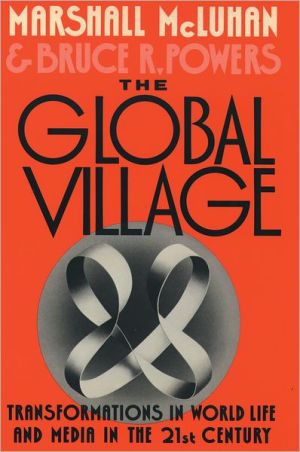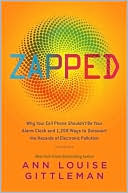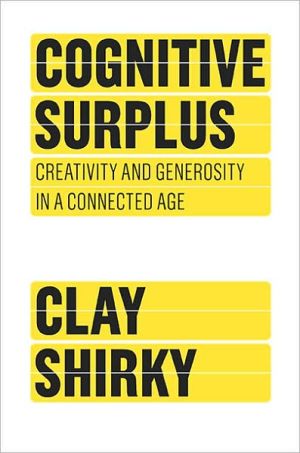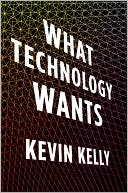The Global Village: Transformations in World Life and Media in the 21st Century
Extending the visionary early work of the late Marshall McLuhan, The Global Village, one of his last collaborative efforts, applies that vision to today's worldwide, integrated electronic network.\ When McLuhan's groundbreaking Understanding Media was published in 1964, the media as we know it today did not exist. But McLuhan's argument, that the technological extensions of human consciousness were racing ahead of our ability to understand their consequences, has never been more compelling....
Search in google:
Extending the visionary early work of the late Marshall McLuhan, The Global Village, one of his last collaborative efforts, applies that vision to today's worldwide, integrated electronic network. When McLuhan's groundbreaking Understanding Media was published in 1964, the media as we know it today did not exist. But McLuhan's argument, that the technological extensions of human consciousness were racing ahead of our ability to understand their consequences, has never been more compelling. And if the medium is the message, as McLuhan maintained, then the message is becoming almost impossible to decipher. In The Global Village, McLuhan and co-author Bruce R. Powers propose a detailed conceptual framework in terms of which the technological advances of the past two decades may be understood. At the heart of their theory is the argument that today's users of technology are caught between two very different ways of perceiving the world. On the one hand there is what they refer to as Visual Space—the linear, quantitative mode of perception that is characteristic of the Western world; on the other hand there is Acoustic Space—the holistic, qualitative reasoning of the East. The medium of print, the authors argue, fosters and preserves the perception of Visual Space; but, like television, the technologies of the data base, the communications satellite, and the global media network are pushing their users towards the more dynamic, "many-centered" orientation of Acoustic Space. The authors warn, however, that this movement towards Acoustic Space may not go smoothly. Indeed, McLuhan and Powers argue that with the advent of the global village—the result of worldwide communications—these two worldviews "are slamming into each other at the speed of light," asserting that "the key to peace is to understand both these systems simultaneously." Employing McLuhan's concept of the Tetrad—a device for predicting the changes wrought by new technologies—the authors analyze this collision of viewpoints. Taking no sides, they seek to do today what McLuhan did so successfully twenty-five years ago—to look around the corner of the coming world, and to help us all be prepared for what we will find there. Publishers Weekly Weighted with technobabble, McLuhan's fervent forecast of a computer-linked global village flies in the face of political realities: ``Mass, spontaneous electronic referendums will sweep across continents. The concept of nationalism will fade. . . . '' A ``new tribalism'' with ``centers everywhere and margins nowhere'' will flourish, and books will be obsolete, or nearly so, by the 21st century, the authors of this futurist tract further assert. McLuhan collaborated on this study with Powers, a communications professor at Niagara University in New York, who completed the manuscript after the media guru's death. Contrasting the ``visual space'' mediated by sequential, left-brain thought processes with the ``acoustic space'' called into being by the pattern-producing right brain hemisphere, the authors put forth catchy but unsubstantiated generalizations about the Oriental mind, Russians, the U.S. economy, entrepreneurship and electronic media. McLuhan's concept of the ``tetrad,'' a four-part intuitive structure rooted in figure-ground relationships, is used here as a predictive tool to gauge the impact of emerging information technologies. (Apr.)
\ Publishers Weekly - Publisher's Weekly\ Weighted with technobabble, McLuhan's fervent forecast of a computer-linked global village flies in the face of political realities: ``Mass, spontaneous electronic referendums will sweep across continents. The concept of nationalism will fade. . . . '' A ``new tribalism'' with ``centers everywhere and margins nowhere'' will flourish, and books will be obsolete, or nearly so, by the 21st century, the authors of this futurist tract further assert. McLuhan collaborated on this study with Powers, a communications professor at Niagara University in New York, who completed the manuscript after the media guru's death. Contrasting the ``visual space'' mediated by sequential, left-brain thought processes with the ``acoustic space'' called into being by the pattern-producing right brain hemisphere, the authors put forth catchy but unsubstantiated generalizations about the Oriental mind, Russians, the U.S. economy, entrepreneurship and electronic media. McLuhan's concept of the ``tetrad,'' a four-part intuitive structure rooted in figure-ground relationships, is used here as a predictive tool to gauge the impact of emerging information technologies. (Apr.)\ \ \ \ \ Library JournalThis is not a revised or updated version of McLuhan's Understanding Media ( LJ 6/1/64) or even War and Peace in the Global Village (LJ 11/1/68). It was written, according to Powers, between 1974 and 1980 (McLuhan died in 1980) and ``put together'' between 1976 and 1984. McLuhan's thesis has always been that electronic technologies have been altering and reconstituting people in ways they don't understand and causing them to lose their private identities. This book probes the same theme from different angles, but with the same McLuhanesque all-over-the-place reasoning. Powers seems to have had a leavening effect on the master's breathless prose and extravagant presentation. The book should provoke people to think, if nothing else. For McLuhan collectors. See also Philip Marchand's Marshall McLuhan and George Sanderson and Frank Macdonald's retrospective, reviewed in this issue, p. 75.-- A.J. Anderson, G.S.L.I.S., Simmons Coll., Boston\ \








